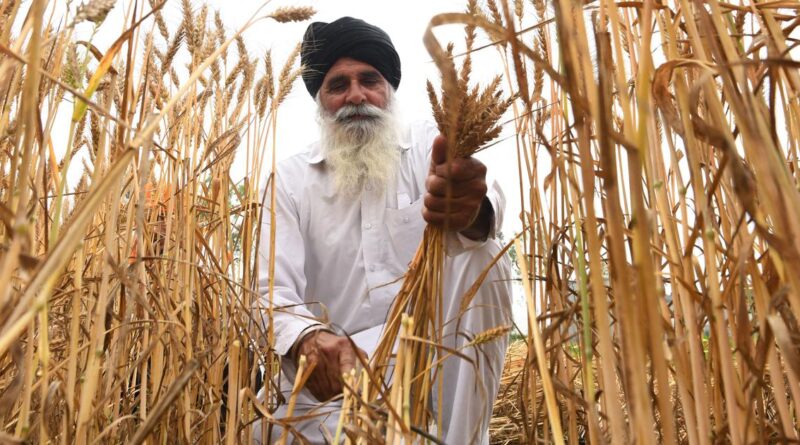Despite record production, government wheat procurement in Punjab falls short of 2024 figures
by Anju Agnihotri Chaba
Although Punjab has witnessed a bumper wheat crop this year, with the highest-ever productivity per hectare, the procurement season has seen a notable decline in government purchases compared to both last year and the previous season.
As of May 8, 2025, the Punjab government has procured 116.29 lakh metric tonnes (LMT) of wheat, marking a drop of 3.07 LMT from the 119.36 LMT procured on the same date last year, and 1.61 LMT less than the 117.90 LMT collected in 2022-23.
This year, Punjab recorded an average yield of 5,390 kg per hectare, according to 94 per cent of the crop-cutting experiments – it estimates crop yield by selecting a representative section of a field, harvesting it, and using the data to project the overall yield for the entire area – conducted by the Punjab Agriculture Department so far. This yield is the highest ever, surpassing the previous record of 5,188 kg per hectare in 2018-19. Only the results of 6 per cent of the crop-cutting experiments are pending, but authorities have stated that these remaining results will not significantly impact the overall productivity.
This year, wheat was grown on 35 lakh hectares in Punjab, leading to a total production of 189 lakh metric tonnes. In comparison, last year, wheat was planted on 35.16 lakh hectares, resulting in a total production of 182 LMT.
This year’s government procurement figures have come down despite what has been described as a “bumper crop” with the total wheat arrivals in mandis (markets) exceeding last year’s numbers till May 8. A total of 127.02 lakh tonnes of wheat has already reached the mandis this season, surpassing the 126.68 lakh tonnes recorded at the same time last year and well above the 122.53 lakh tonnes recorded in 2022-23.
However, while the quantity of wheat reaching the mandis is high, the pace of government procurement has slowed considerably. Of the 127.02 lakh tonnes arriving in mandis this year, 126.62 lakh tonnes have been purchased, including 10.32 lakh tonnes procured by private players.
Last year, in the entire season, approximately 134.13 lakh tonnes of wheat had arrived in the mandis. This year, the procurement season will end on May 31. With just weeks left until the official end of the season, it seems increasingly unlikely that the government will meet last year’s procurement target.
Why the slowdown in government purchases
One of the key reasons for the decline in government procurement is the increased participation of private players in the wheat market. This season, private traders have been more aggressive in sourcing wheat directly from farmers, offering competitive prices and incentives. As a result, some farmers have opted to sell their wheat to private buyers instead government.
With private traders offering a slightly higher price than the Minimum Support Price (MSP), farmers have also started holding back a portion of their wheat in anticipation of better prices in the coming weeks.
“The private players are offering better prices than the government right now. With a bumper crop this year, some of us have decided to hold on to a part of our wheat and sell it later when the prices might go higher,” said Gurmail Singh, a farmer from Ludhiana district. “It’s a risky strategy, but we have seen the prices going up in the last year too, so it is worth the wait,” he added.
As of Thursday, May 8, less than 1 lakh tonnes of wheat is expected to arrive in mandis, with only about 76,000 tonnes recorded on that day. This indicates that the bulk of the wheat has already been procured by the government, and now the remaining wheat supply is dwindling.
The procurement season in Punjab typically runs until the end of May, but it is clear that with only 5 per cent of the expected supply remaining to be sold, government procurement this year will fall significantly short of last year’s total of 12.5 million tonnes (approximately 125 lakh tonnes). Experts believe that the state’s procurement agencies are unlikely to match the wheat procured in the previous season, with the final figure likely to be considerably lower.
This article has been republished from The Indian Express.

